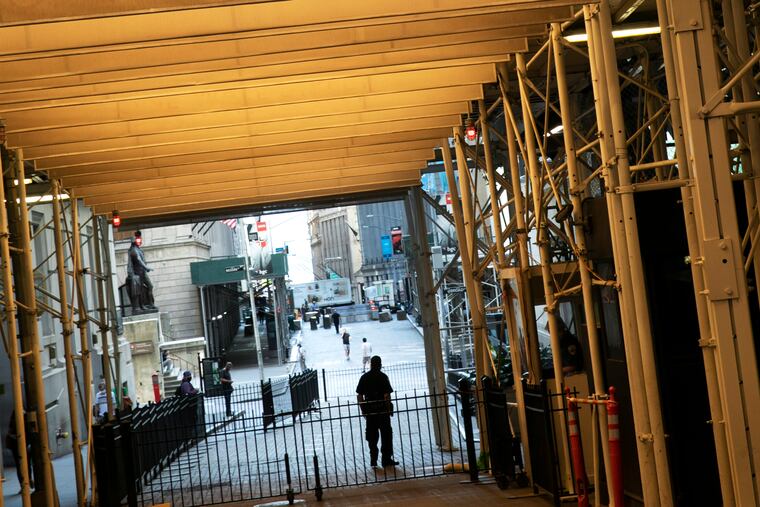Some positive economic outcomes have occurred amid the pandemic but Congress needs to do more now to avoid setbacks
Congress needs to help state and local governments that are hemorrhaging red ink and provide more support to businesses and to unemployed and financially stressed people. Most importantly, Congress needs to act before its August recess.

Although there is no sugarcoating the devastating economic blow caused by the COVID-19 pandemic, there have been some bright spots.
Most surprising is the rally in the stock market. When the pandemic struck in full force in March, the stock market quickly lost more than a third of its value, wiping out more than $12 trillion in wealth in a few weeks. That was what the entire stock market was worth as recently as a decade ago.
However, since those darkest days, the stock market has come roaring back. It hasn’t completely recovered to its pre-COVID record highs, but it is close, and it is higher today than it was a year ago. The Nasdaq, a stock index that is heavy on the highest-flying technology companies, has hit record highs.
That the stock market has staged such a comeback, even with unemployment still in the double digits, is testimony to the Federal Reserve’s aggressive actions. It has effectively erected a firewall between the problems raging in the economy and the financial system. Investors know the Fed has their back and will do whatever is needed to ensure they don’t suffer big losses. Because of the Fed’s backstop, even a company such as Carnival Cruise Line, whose business has been shut down by the pandemic and will be for some time, can get the credit it needs to avoid shutting down forever and wiping out investors.
Federal Reserve Chairman Jerome Powell has also told investors point-blank that the Fed will keep interest rates effectively at zero until the economy is back to full employment. The Fed is generally opaque about where interest rates will be a year or two from now. But given that it could take years for unemployment to get to where the Fed would feel comfortable raising interest rates, investors have been emboldened to bid up stock prices.
The housing market has also been a huge surprise. Housing is typically first into recession and often is a leading contributor to the economy’s problems in the downturn. It was ground zero for the financial crisis just more than a decade ago. Not this time. Home sales and housing construction suffered when most of the nation was locked down in March and April, but have revived quickly since. Applications to get a mortgage to purchase a home are higher today than they were pre-pandemic, a clear indication that Americans are out buying homes again.
Record low mortgage rates, again courtesy of the Fed, are providing a powerful tailwind to housing. The rate on a 30-year fixed rate mortgage is just more than 3%, which is lower than house price growth in most parts of the country. That is, the cost of financing the purchase of a home is lower than the return on that home. That’s a green light to buy.
Housing has also received a big boost from government agencies that are responsible for almost three-fourths of all mortgage loans made in a typical year. Despite the chaos created by the pandemic, these agencies have kept their doors open for potential home buyers to get a loan. They have also provided forbearance for the tens of millions of households that already have a loan from them. Those households that have lost a job or income because of the pandemic don’t need to pay on their mortgages backed by these agencies for up to a year.
Also surprising has been the modest increase in the number of business failures and bankruptcies. Businesses are struggling, but most are hanging on despite the lengthy shutdowns and the ongoing social-distancing rules. A lifeline for many businesses, particularly smaller and thus more vulnerable smaller companies, is the Paycheck Protection Program. The PPP has had its troubles getting funds to the smallest companies in the areas hit hardest by the pandemic, but without it many more out-of-business signs would have been hanging on store windows across America.
These positive surprises are worth considering, not only because it feels good, given all the bad news, but because they highlight that with some deft policymaking, we can navigate through this pandemic reasonably well. But policymakers need to quickly do more, particularly because COVID-19 infections are on the rise again.
Congress and the Trump administration are debating another round of fiscal rescue for the economy. They are considering whether to help state and local governments that are hemorrhaging red ink and slashing jobs and programs, and whether to provide more financial support to businesses and to unemployed and financially stressed people.
They need to end the debate and pass legislation before Congress goes on its August recess.
With more help from policymakers, we will get more positive surprises and the economy will avoid sliding backward. Without help, it will be a long time before we get another positive surprise.
Mark Zandi is chief economist of Moody’s Analytics.